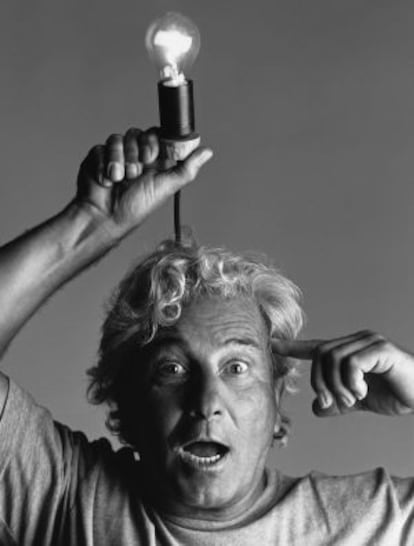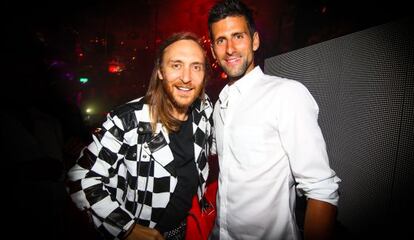Pachá: still crazy after all these years
A new documentary looks at the life and times of the brand’s founder, Ricardo Urgell

The 45-minute conversation explored a number of issues, from the correlation between the current situation of Pachá Sitges and the rise of Catalan independence, his regrets about not having behaved more like a gangster, and his belief that only at night can one know the true nature of people. Two minutes after he hung up the phone, however, Ricardo Urgell, the 75-year-old founder of the Pachá chain of nightclubs, calls his interviewer back.
“Look, the thing is that I pressed the play button to record the conversation, and I don’t know why, but nothing has been recorded,” he says. “Could you send me what you taped?” We tell him that we have been taking notes, that there is no recording. There is a silence. “The thing is,” Urgell finally replies, “it’s just that my children don’t trust me when it comes to what I might say in interviews – they think that I sometimes say too much. And, well, I wanted them to hear the conversation.”
Urgell invented going out as we know it, seemingly without making any effort or following any trend
On the eve of the premiere of the screening of the documentary Pachá, el arquitecto de la noche – or, Pachá, the architect of the night, which was shown on May 25 in Madrid’s Cine Capitol, later to be broadcast on Canal+ – Ricardo has once again taken on the media. In his own way, of course. While the documentary is interesting, dynamic, and filled with hilarious anecdotes about a career that began in Sitges in 1967 and that has converted Pachá into perhaps the most respected and global icon of nightlife on the planet, what its founder has to say about success bears no relationship to the usual clichés employed by such businessmen. He invented going out as we know it, and has been in fashion for almost 40 years, seemingly without making any effort or following any trend.
It could be argued that Pachá was the first global Spanish brand. But that’s not to say that Urgell is without criticism of his home country, and the way things are going politically. “To tell you the truth, I don’t know where this is all going to end. The people managing all this have no idea. I have never voted. Why am I going to vote for somebody I don’t know?” says Urgell, who has some 20 discotheques in 13 countries, a hotel, four restaurants, a boat, a record label, and even a fashion brand. In the coming years he hopes to have 25 hotels and 65 restaurants and nightclubs. “Having Pachá franchises is very difficult. If we were McDonald’s it would be much easier,” he confesses.

Only somebody of this stature would have dared, in 2013, when Las Vegas was challenging Ibiza as the world capital of dance music, to refuse to pay the astronomical fees of star DJs such as Tiësto or Swedish House Mafia (€100,000 a night). “Electronic music has not evolved in 20 years and is now fit only for idiots,” his younger brother, Piti, told The New York Times. It seems that loquaciousness is a family characteristic.
“I regret many things I have done and there are many things I wish I had done, but above all, I regret not having been more of a son-of-a-bitch,” says Ricardo. “I have had a very light touch, I’ve been very clean. And in this world you have to be dirty.”
The businessman then moves on to make a lengthy apology for his performance in the documentary.
Trailer for the Pachá documentary (Spanish language).
“The thing is that a lot of people are going to complain – all those I wasn’t able to mention because there wasn’t time or simply because I forgot. You’ll see, they’ll show the documentary and people will start calling me to say, ‘Ricardo, you didn’t talk about me!’” Urgell doesn’t like this, because if Pachá is famous, it is not just for attracting A-listers of all kinds – can there be a celebrity who hasn’t spent an evening at one of his discos? – but for the way he has treated them.
And of course, this is where Ricardo’s personality comes in. “As far as I am concerned, they are all equal. Rich and poor. Everybody is treated the same, and the idea is to give people freedom, within certain rules, and let’s face it, if there’s one thing we have too many of these days, it’s rules. There’s even talk of stopping people from fucking in discotheques! Don’t get me wrong, but under Franco, nobody took any notice of us and everything was much more free. Today, what you can do with your business depends on whether you are friends with an important politician. And I don’t have any friends like that.”
Tu suscripción se está usando en otro dispositivo
¿Quieres añadir otro usuario a tu suscripción?
Si continúas leyendo en este dispositivo, no se podrá leer en el otro.
FlechaTu suscripción se está usando en otro dispositivo y solo puedes acceder a EL PAÍS desde un dispositivo a la vez.
Si quieres compartir tu cuenta, cambia tu suscripción a la modalidad Premium, así podrás añadir otro usuario. Cada uno accederá con su propia cuenta de email, lo que os permitirá personalizar vuestra experiencia en EL PAÍS.
¿Tienes una suscripción de empresa? Accede aquí para contratar más cuentas.
En el caso de no saber quién está usando tu cuenta, te recomendamos cambiar tu contraseña aquí.
Si decides continuar compartiendo tu cuenta, este mensaje se mostrará en tu dispositivo y en el de la otra persona que está usando tu cuenta de forma indefinida, afectando a tu experiencia de lectura. Puedes consultar aquí los términos y condiciones de la suscripción digital.









































